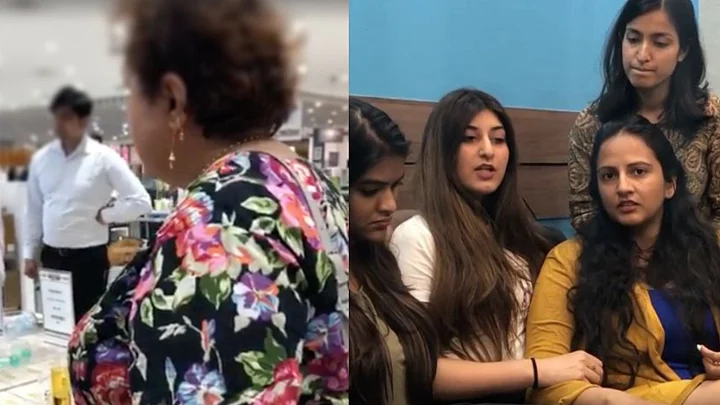‘Think before you speak’ may be a time-worn saying but it holds merit in our tweet-first-think-later day and age.
Language is anything but neutral. ‘Rape’, as the recent Gurugram moral policing incident shows, is a loaded word that cannot be used to mete out punishment as one sees fit.
However, as we assess the incident — the woman’s alleged “you should be raped” comment, the recording of the video, how the six women approached the situation, the social media support and outrage, and finally the media coverage of it all — we must pay some attention to our own words.
What we seem to have not noticed is that the words we use shape the narration of this incident and many more like it.
Don’t have the time to read? You can listen to the story here:
‘Girls’ or Why We Must Stop Infantilising Women
“Young Girls Call out Delhi Woman for Asking Seven Men to Rape Girls for Wearing Short Dress”
This is one of the top headlines about the incident. Other headlines for reports that surfaced after the viral video was posted were more or less a permutation and combination of these words.
Notice the use of the phrase ‘young girls’ in the headlines. The designated ‘young girls’ in the viral video were clearly above eighteen years of age. Then why are articles — both in support of them and those critical of their actions — bent on calling them ‘young girls’ instead of ‘women’?
The phrase ‘young girls’ suggests a certain naïveté. It seems to suggest that these twenty-something women don’t know better. Coupled with this are other stereotypes that enable the ‘dumbing-down’ of women and restricting their expression.
That the ‘girls’ are ‘naïve’ is also the opinion that the woman in the video holds, which is what leads her to ‘school’ them on the topic of wearing clothes of a certain length. Except that the women being ‘schooled’ for their choice of clothes are fully aware of what they are doing.
The infantilising tendency of the phrase ‘young girls’ or even just ‘girls’ — which shouldn’t be hard to miss here — is completely normalised and ingrained in our vocabulary. It is as much a part of the patriarchal system that leads the woman in the video to use a rape-threat.
Some other articles refer to the woman in the video as a ‘desi aunty’ or ‘Delhi aunty’, phrases that reek of unwarranted ageism that negates the seriousness of her opinion too.
‘If It Were Men...’ or the (Un)Easy Gender-Exchange
A discussion that unsurprisingly ensued on social media, as more and more criticism was levelled against the six women, was that if instead of the six women, there were six men who had followed and shouted down the woman in the video, their actions would have met with outrage.
The problem with this ‘if it were men’ argument is its ‘easy’ exchange of gender. Men, in a patriarchal setup, have more access to public spaces, more freedom to express their opinions openly and (often) loudly, they tend to be taken seriously — much more seriously than ‘young girls’ — and are not usually questioned on their choice of attire.
So ‘if it were men’, then the entire context of the incident would change. What would also change are the power equations and the woman’s reaction. Fear would come in as would the threat of violence, this time from the men rather than from the woman.
‘If it were men’ in ‘short’ clothes, the whole incident would not occur in the first place. Neither would they be questioned for their choice of clothes nor be threatened by a woman with rape at the hands of people around them.
The ‘easy’ exchange of gender, the ‘if it were men’ argument, in an incident like this is really NOT that easy.
‘Man or Woman’ or Our Gender Trouble
Talking of gender, even the most ‘progressive’ discussions on rape culture that (re)emerged after the incident, displayed gender blindness in saying that women don’t “deserve to be raped” for wearing clothes of their choice.
Some went on to include men in this assertion but most forgot that rape affects other genders too — and some genders more than others — comfortable as they were in the man/woman binary.
So, here’s a question — that I ask at the cost of being called a ‘what-about-er’ — what if the ‘schooled’ party were a group of people who identified as non-binary? Would the ‘schooling’ narrative change? How will the incident pan out? Will their voices be heard?
Does a discussion on rape culture, then, need to be more inclusive and aware?
Finally, should we think more about our own biases, ingrained ideas, and prejudices before we speak?
